牛津英语六级全级重点知识点句型单词短语整理总结
牛津英语六年级期末考试知识点梳理Unit 6—Unit 10

牛津英语六年级期末考试知识点梳理(unit 6—unit 10)Unit 6 Going to school1.live near school /live far away from school2.by bus = go by bus by ferry = go by ferryby underground = go by undergroundgo to school on foot = walk to school3.It takes sb. some time to do sth. 某人花多少时间做某事It takes him about ten minutes to get there. 他花大约十分钟到那里。
How long does it take him to get there?4.sb. spend some time (in) doing sth. 某人花多少时间做某事spend twenty minutes travelling to school = spend twenty minutes in travelling to school花费大约二十分钟去学校It takes him about ten minutes to travel to school every day. = He spends about ten minutes (in) travelling to school every day. 他每天花费大约二十分钟去学校。
cost 花费(指花钱,以物作主语)sth. cost sb. timespend 花费(指花钱,时间,以人作主语)sb. spend …on sth. 花钱买某物pay 花费(指花钱,以人作主语) sb. pay… for sth. 花钱买某物The watch cost Tom 3000 yuan. =Tom spent 3000 yuan on the watch. =Tom paid 3000 yuan for the watch. 汤姆花3000块买了块手表。
沪教牛津版六年级英语上册全册知识点点汇总
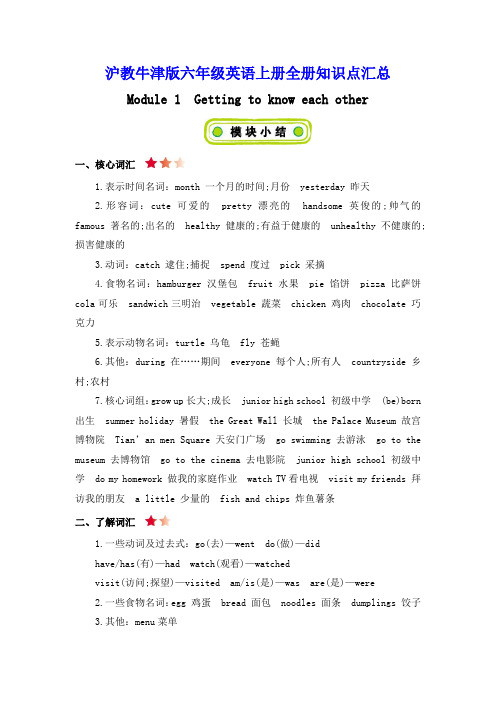
沪教牛津版六年级英语上册全册知识点汇总Module 1 Getting to know each other一、核心词汇1.表示时间名词:month 一个月的时间;月份yesterday 昨天2.形容词:cute 可爱的pretty 漂亮的handsome 英俊的;帅气的famous 著名的;出名的healthy 健康的;有益于健康的unhealthy 不健康的;损害健康的3.动词:catch 逮住;捕捉spend 度过pick 采摘4.食物名词:hamburger 汉堡包fruit 水果pie 馅饼pizza 比萨饼cola可乐sandwich三明治vegetable 蔬菜chicken 鸡肉chocolate 巧克力5.表示动物名词:turtle 乌龟fly 苍蝇6.其他:during 在……期间everyone 每个人;所有人countryside 乡村;农村7.核心词组:grow up长大;成长junior high school 初级中学(be)born 出生summer holiday 暑假the Great Wall 长城the Palace Museum 故宫博物院Tian’an men Square 天安门广场go swimming 去游泳go to the museum 去博物馆go to the cinema 去电影院junior high school 初级中学do my homework 做我的家庭作业watch TV看电视visit my friends 拜访我的朋友 a little 少量的fish and chips 炸鱼薯条二、了解词汇1.一些动词及过去式:go(去)—went do(做)—didhave/has(有)—had watch(观看)—watchedvisit(访问;探望)—visited am/is(是)—was are(是)—were2.一些食物名词:egg 鸡蛋bread 面包noodles 面条dumplings 饺子3.其他:menu菜单三、核心句型1.Her hair was short and her eyes were big. 她那时头发很短而且眼睛很大。
英语六级的常见语法知识点整理

英语六级的常见语法知识点整理英语语法在六级考试中扮演着重要的角色,掌握常见的语法知识点对于提高写作和阅读的能力至关重要。
下面是对英语六级的常见语法知识点进行整理,以帮助大家更好地备考。
1. 时态与语态时态和语态是英语语法的基础,正确的时态和语态使用可以使句子表达得更加准确。
常见的时态包括一般现在时、一般过去时、一般将来时、现在进行时、过去进行时、过去将来时等等。
而语态主要包括主动语态和被动语态。
在写作中要根据语境和需求选择适当的时态和语态。
2. 名词名词在英语中起到名词性质,具有单数和复数形式。
常见的名词复数形式有加s,加es,变元音等形式。
名词还包括可数名词和不可数名词,可数名词有可数单数和可数复数形式,而不可数名词只有单数形式。
3. 代词代词是用来代替名词的词语,常见的代词包括人称代词、物主代词、反身代词、指示代词、相互代词等等。
代词的正确使用可以使句子紧凑且表达清晰。
4. 冠词冠词包括不定冠词和定冠词,分别是a/an和the。
不定冠词用于泛指,表示不确定或不具体的概念,而定冠词用于特指已知的人或事物。
5. 介词介词在句子中起到连接作用,连接名词、代词或其他词语。
常见的介词有in、on、at、by、with等等。
正确地使用介词可以使句子结构清晰且意思明确。
6. 形容词和副词形容词和副词用来描述名词和动词,形容词描述名词的特征,而副词描述动词的程度或方式。
形容词和副词有比较级和最高级两种形式,用于比较事物的大小、程度或者其他属性。
7. 动词动词是句子中的核心,表示动作、状态或存在。
动词的时态、语态、人称和数等变化形式都需要掌握。
常见的动词形式包括不定式、现在分词、过去分词等等。
8. 连词连词用于连接句子、短语和单词,分为并列连词、从属连词和转折连词。
并列连词用于连接并列的句子或短语,常见的有and、but、or 等;从属连词用于引导从句,常见的有that、if、because等;转折连词用于引导转折关系的从句,常见的有however、although等。
牛津英语六年级知识点总结
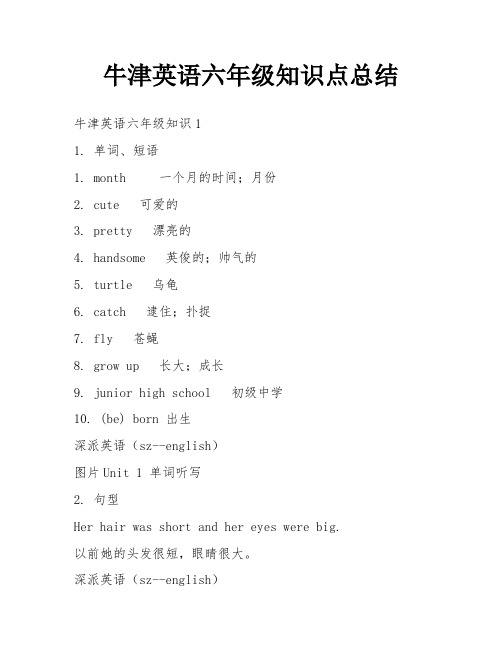
牛津英语六年级知识点总结牛津英语六年级知识11. 单词、短语1. month 一个月的时间;月份2. cute 可爱的3. pretty 漂亮的4. handsome 英俊的;帅气的5. turtle 乌龟6. catch 逮住;扑捉7. fly 苍蝇8. grow up 长大;成长9. junior high school 初级中学10. (be) born 出生深派英语(sz--english)图片Unit 1 单词听写2. 句型Her hair was short and her eyes were big.以前她的头发很短,眼睛很大。
深派英语(sz--english)图片Unit 1 Lisen and say 听写图片Unit 1 Read a story 听写3. 重难点1.一般过去时表示过去某个时间里发生的动作,常和表示过去的时间状语连用,如:yesterday,last night,this morning,in 1990,ago,since 1999,last(week,year,night,month...)等。
2.过去式顺口溜动词一般过去时,表示过去发生的事;一般动词加ed,若是特殊得硬记;be 用was 或用were,have,has变had;谓语动词过去式,过去时间做标志;否定句很简单,主语之后didn't添;疑问句也不难,did放在主语前。
牛津英语六年级知识21. 单词、短语1. famous 著名的;出名的2. during 在......期间3. spend 度过4. everyone 每个人;所有人5. countryside 乡村;农村6. pick 采摘7. summer holiday 暑假深派英语(sz--english)图片Unit 2 单词听写2. 句型1. How was your summer holiday?你的暑假过得怎样?2. It was wonderful!We went to the Great Wall.非常棒!我们去了长城。
牛津英语六年下册各单元重点知识点归纳与整理
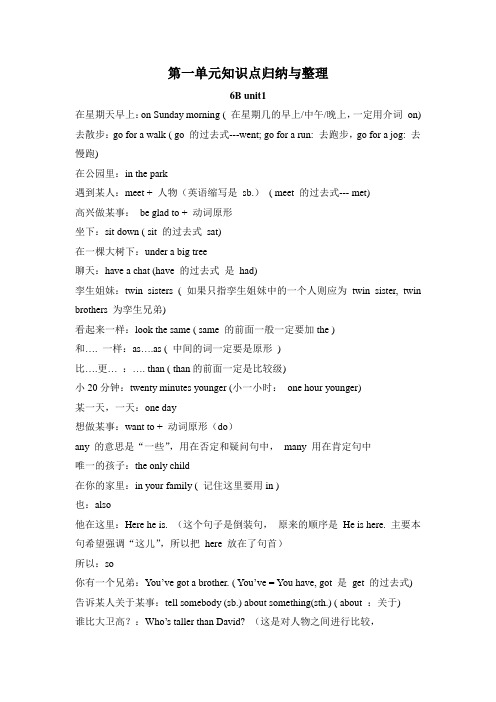
第一单元知识点归纳与整理6B unit1在星期天早上:on Sunday morning ( 在星期几的早上/中午/晚上,一定用介词on) 去散步:go for a walk ( go 的过去式---went; go for a run: 去跑步,go for a jog: 去慢跑)在公园里:in the park遇到某人:meet + 人物(英语缩写是sb.)( meet 的过去式--- met)高兴做某事:be glad to + 动词原形坐下:sit down ( sit 的过去式sat)在一棵大树下:under a big tree聊天:have a chat (have 的过去式是had)孪生姐妹:twin sisters ( 如果只指孪生姐妹中的一个人则应为twin sister, twin brothers 为孪生兄弟)看起来一样:look the same ( same 的前面一般一定要加the )和…. 一样:as….as ( 中间的词一定要是原形)比….更…:…. than ( than的前面一定是比较级)小20分钟:twenty minutes younger (小一小时:one hour younger)某一天,一天:one day想做某事:want to + 动词原形(do)any 的意思是“一些”,用在否定和疑问句中,many 用在肯定句中唯一的孩子:the only child在你的家里:in your family ( 记住这里要用in )也:also他在这里:Here he is. (这个句子是倒装句,原来的顺序是He is here. 主要本句希望强调“这儿”,所以把here 放在了句首)所以:so你有一个兄弟:You’ve got a brother. ( You’ve = You have, got 是get 的过去式) 告诉某人关于某事:tell somebody (sb.) about something(sth.) ( about :关于)谁比大卫高?:Who’s taller than David? (这是对人物之间进行比较,句型为:Who’s +比较级+ than…? 回答是:人称代词+ is )谁的书包更重,你的还是我的?:Whose school bag is heavier,yours or mine?看到句中有or, 前面一句话里的形容词或副词就要用比较级;句型为:Whose …. is + 比较级,… or…? 回答是:名词性物主代词+ is. /名词所有格+ is. yours 和mine 是名词性物主代词,名词性物主代词一定单独使用,后面不再跟名词。
牛津6A复习提纲
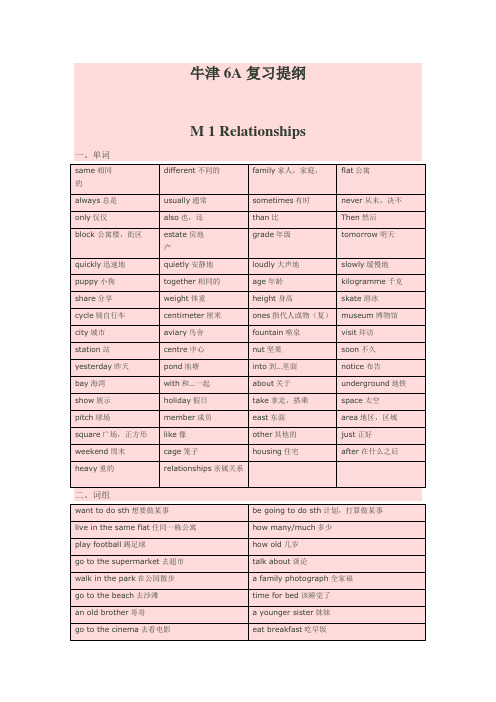
bringsthtosb把某物带给某人
help do…帮忙做…
cook food forsb为某人烧食物
the top floor顶楼
live in …住在…
live at…住在…(地址)
live on the … floor住在第…层
a tennis court网球场
teacher教师
kindergarten幼儿园
behind在…后面
near在…附近
address地址
kitchen厨房
bedroom卧室
sitting-room客厅
bathroom浴室
court场地,球场
tennis网球
crowded拥挤
traffic交通
pavement人行道
tram电车
minibus面包车
如:How many apples have you got?你有几个苹果?
(9)It’s time for bed .= It’s time to go to bed.
(10)play with有两种意思:一是“和……一起玩”,二是“玩弄”。
如:I like to play with my friends.我喜欢和朋友们一起玩。
如:They live in the same estate.他们住在同一小区里。
same和different互为反义词。different后面需要跟名词复数形式,而the same的后面跟的是名词单数形式。
如:Ben and Kitty are in different classes.本和凯蒂在不同的班级里。
number数字,号码
牛津版六年级上册Unit 6 知识点总结
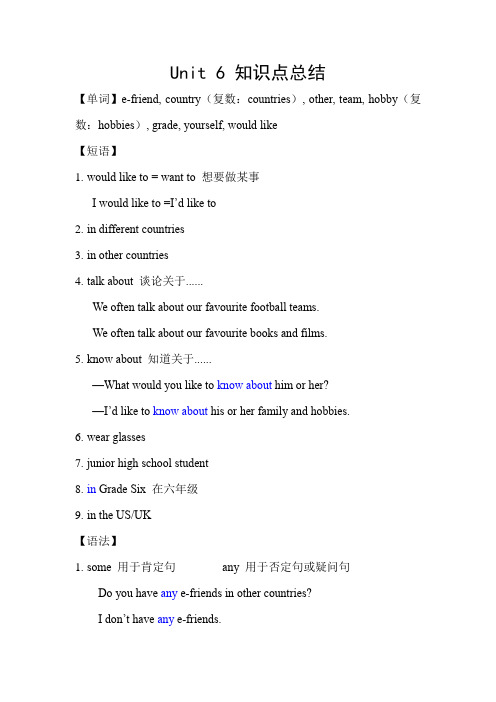
Unit 6 知识点总结【单词】e-friend, country(复数:countries), other, team, hobby(复数:hobbies), grade, yourself, would like【短语】1.would like to = want to 想要做某事I would like to =I’d like to2.in different countries3.in other countries4.talk about 谈论关于......We often talk about our favourite football teams.We often talk about our favourite books and films.5.know about 知道关于......—What would you like to know about him or her?—I’d like to know about his or her family and hobbies.6.wear glasses7.junior high school student8.in Grade Six 在六年级9.in the US/UK【语法】1.some 用于肯定句any 用于否定句或疑问句Do you have any e-friends in other countries?I don’t have any e-friends.2.get... from...从......得到......I get your email from the E-friend Club.3.like + 动词ingI like playing football.love + 动词ingI love playing football.【句子】1.I have some e-friends in different countries.2.We both like football.3.反问对方:你呢?What about you?How about you?4.Would you like to have e-friends in other countries?—Would you like to have one?—Yes, I’d like to have an e-friend in the US.5.I’d like to be your e-friend.I’d like to be your e-friend too.6.I am from China. I am 11 years old, and I wear glasses.7.There are four people in my family: my father, my mother, my brother Ben and me.8.I go to Happy Primary School. I am in Grade Six.9.My favourite subjects are Maths and Music. I like singing and playingtable tennis. I also like reading.Science and English are my favourite subjects. I like playing football and chess.10.Please write back soon and tell me about yourself.Write soon.11.Thank you for your email and your photo.【国家和城市】AustraliaCanadathe UK Londonthe USFrance ParisJapan TokyoChina Beijing【复习回顾】1.be from...来自......He is from the UK.She is from China.2.人名’s ...的Peter’s e-friend Peter的网友Jill is Peter’s e-friend.Joe can be Kitty’s e-friend.【写作】注意写信、电子邮件的格式。
上海版牛津英语六年级(上、下)全重点知识点复习整理
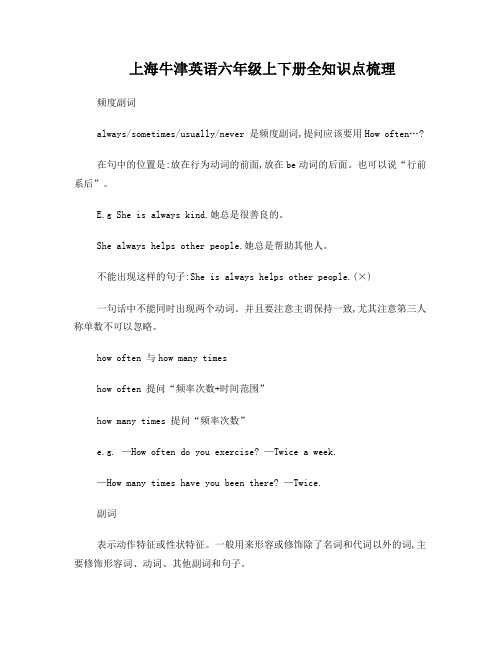
上海牛津英语六年级上下册全知识点梳理频度副词always/sometimes/usually/never 是频度副词,提问应该要用How often…?在句中的位置是:放在行为动词的前面,放在be动词的后面。
也可以说“行前系后”。
E.g She is always kind.她总是很善良的。
She always helps other people.她总是帮助其他人。
不能出现这样的句子:She is always helps other people.(×)一句话中不能同时出现两个动词。
并且要注意主谓保持一致,尤其注意第三人称单数不可以忽略。
how often 与how many timeshow often 提问“频率次数+时间范围”how many times 提问“频率次数”e.g. —How often do you exercise? —Twice a week.—How many times have you been there? —Twice.副词表示动作特征或性状特征。
一般用来形容或修饰除了名词和代词以外的词,主要修饰形容词、动词、其他副词和句子。
He looks very happy.(修饰形容词)The old lady is walking slowly now.(修饰动词)Luckily, he got the first prize.(修饰句子)形容词后面+ly构成副词:slow—slowly slight—slightly quick—quickly careful—carefully fierce—fiercely immediate—immediately gentle—gently lucky—luckily happy—happily介词What else do you do with your…?你和你的…还干什么?With是个介词,后面接人称代词时,要用宾格的形式。
- 1、下载文档前请自行甄别文档内容的完整性,平台不提供额外的编辑、内容补充、找答案等附加服务。
- 2、"仅部分预览"的文档,不可在线预览部分如存在完整性等问题,可反馈申请退款(可完整预览的文档不适用该条件!)。
- 3、如文档侵犯您的权益,请联系客服反馈,我们会尽快为您处理(人工客服工作时间:9:00-18:30)。
6Aunit 1 public signs知识点:1 标志语:○1以No开头的,表示禁止做某事,后面要用ing形式,如:No swimming.○2以don’t 或者do not 开头的,也表示禁止做某事,不过后面动词要用原型(秦淮一中心小学期中考试,完型填空和填空题目考到)如:Do not touch.○3以动词原形开头的,如:Be quiet.2情态动词○1must,would should,can,may都是情态动词;must表示必须一定要做的事情;would表示想要做的事情,would like to do sth;should(shouldn’t)表示应该或不应该;can表示能够,会做某事;may表示可以或允许做某事。
○2情态动词,没有人称和数的变化,后面都跟动词原型。
○3变成一般疑问句,将情态动词提到句子开头。
○4变成否定句,在后面加not,有的可以缩写:should not= shouldn’t, can not=can’t would not=wouldn’t will not =won’t重点句型:1 ——What does it /this/that/mean?它/这个/那个是什么意思?It means you /wemust/should/shoudn’t..意思是你/我们必须/应当/不应该。
解析:当你不知道一个标志、一个词语或者一句话的意思时,可以用这句话来询问。
同时可以用It means…来回答。
2——Can I ….?我能。
吗?——No,you can’t.You should …now.不,你不能。
你现在应该。
解析:当你想做某事的时,可以用这句话来询问。
否定回答后,可以用You should。
给出建议。
重点单词:四会要求:always 总是question问题ask问,请求,要求mean 意思是,意指must必须,应当should应当,应该shouldn’t=should not不应该take a walk散步pick拾,采pick up拾起,捡起三会要求:public公共的,公众sign标志;告示牌子cousin堂(表)弟姐妹danger危险away(离)开grass草地、草keep off(使)让开,(使)不接近。
bird鸟cage笼子quiet安静的,静静的be quiet 保持安静noise噪声,喧闹声make noise发出(喧闹)声音smoke 吸烟litter乱丢杂物park停放汽车stay away (from)…(使)远离touch触,摸,接触Do not touch禁止触摸suddenly突然(地)something某事;某物note钞票,纸币around周围;在附近look around环顾,往四下看nearby附近的quickly快地keeper看守人come up上来point 指fine 罚款重点短语:Public signs 公共标志No smoking 禁止吸烟No littering 禁止乱丢杂物No parking禁止停车Do not touch 禁止触摸No eating or drinking禁止吃喝Keep off the grass 禁止践踏草坪Be quiet安静Make noise制造噪音go in 进去On the bird’s cage在鸟笼上take a walk散步Look around环顾walk on the grass在草地上走Stay away from远离Unit 2 Ben’s birthday知识点:1 序数词:表示次序的词为序数词。
由基数词变序数词的规则:基变序,有规律,词尾加上-th(fourth,sixth);第一、第二、第三特殊记,结尾字母t d d(first,second,third);八去t;九去e(eighth,ninth);ve要用f替(fifth,twelfth);ty将y改成i,th前面有个e(twentirth,thirtieth);若是碰到几十几,前用基来后用序(twenty-first)。
2 介词in on at 的用法In 表示“段”时间,常用在年份、月份、季节前,也用在上午、下午和晚上前。
On表示具体的某一天,常用在星期、具体的一天前。
At用在时刻前,如:at ten o’clock在十点钟。
重点句型1 When’s your birthday?你生日是什么时候?解析:这个句子可以这样回答:It’s on +日期\in +月份英语中可以用when 来对时间和日期进行提问。
如:他什么时候去动物园?When does he go to the zoo?2 My birthday’s on ….我的生日在。
解析:英语中“日”是用序数词来表示的。
1月1日:The first of January 在具体哪一日要用介词on.3 ——What would you like as a birthday present?你想要什么东西做生日礼物?——I’d like ..我想要。
Would like 想要○1通常可以缩成‘d like与want 意思用法都相同。
○2Would like后接动词用动词不定式,would like to do sth○3Would you like +sth(some不变成any)?重点单词:四会要求:birthday生日date日期when什么时候,何时when’s= when is first第一(的)second第二(的)third第三(的)fourth 第四(的)present礼物、赠品March三月April四月May五月June六月三会要求:January一月February二月July七月August八月September九月October十月November十一月December十二月fifth第五sixth第六twelfth第十二twentieth第二十twenty-first 第二十一VCD影视光碟Alddin阿拉丁wait等待Let’s wait and see.让我们等着瞧。
Doorbell门铃take off脱下costume全套服饰、戏服Happy birthday to you!祝你生日快乐blow out 吹灭candle蜡烛重要短语:Ben’s birthday本的生日Have a birthday party 举行生日聚会Talk about something谈论某事Talk to \with somebody和某人谈话Blow out the candles 吹灭蜡烛Take odd your coat 脱下你的外衣Take it off脱下它(代词要放在中间)Japanese cartoons 日本动画片Let’s wait and see让我们等会看As a birthday present作为一个生日礼物In May 在五月On the first of April在四月一日Unit3 It was there!知识点:一般过去式态○1一般过去时表示过去的动作或者状态。
这种动作或状态可能是一次性的,也可能是经常性的。
○2be动词的过去式单数was复数是were○3否定句,直接在was were的后面加上not例如:I was at home yesterday(改为否定句)I was not at home yesterday.○4一般疑问句把was,were提到前面例如——I was at home yesterday(改为一般疑问句)——Were you at home yesterday ?——Yes,I was\No I wasn’t重要句型:1 Where’s my \your 我的、你的。
在哪儿?(用来对单数提问)——It’s on\in\in front of\between the 它在。
上面、在。
里面、在。
前面、在。
中间——Where’s my crayon?我的蜡笔在哪儿——It’s between the books.它在书中间。
2 ——where are our/your…我们的、你们的。
在哪儿?(用来对复数提问)——They’re on\in \in front of\between the..它们在。
上面、在。
前面、在。
中间。
——Where are your books?你的书在哪儿?——They’re on the bookcase.在书架上。
3 It isn’t there now.它现在不在那了。
(指现在)It was there a moment ago.它刚才在那儿(只过去,现在不在了)They were there a moment ago。
他们刚才在那儿。
(复数形式)四会要求:was是(am,is的过去式)wasn’t=was notwere是(are的过去式)weren’t=were not excited兴奋的、激动的take photos拍照片look for寻找moment片刻、瞬间ago以前a moment ago刚刚just now刚才mobile phone手机glasses眼镜三会要求sports day体育运动日race 比赛running race赛跑exciting令人兴奋的、令人激动的camera照相机film胶卷;电影ground地面earphone耳机diary日记CD Walkman光盘随身听roll卷,卷状物a roll of film一卷胶卷remember 记住find(指的是寻找的结果)重点词组:Sports Day 体育运动日all the stedents 所有的学生Watching a running race 观看赛跑look for 寻找(指寻找的过程)A moment ago 一会儿前just now刚才Pick them up 把它们捡起来A pair of glasses 一副眼镜A roll of film一卷胶卷Try to remember试着记住Unit 5 On the farm知识点:1 一般过去时的集中句子结构○1陈述句:a 肯定句:主语+动词的过去式+其他。
B 否定句:主语+助动词didn’t+动词原型+其他。
○2一般疑问句:助动词Did + 主语+动词原型+其他。
○3特殊疑问句:特殊疑问句What+助动词did+主语+动词原型+其他。
2 There be 句型的过去时态○1肯定句:There was\were a\ an\some。
○2否定句:There wasn’t\weren’t a \an\any○3一般疑问句:Was\Were there a \an \any…?回答:Yes there was\were,No there wasn’t/weren’t四会要求:holiday假日、假期last最近刚过去的、最后的early早的meet遇见,见到;相遇before在……以前did(do的过去式)pull up拉出、把……向上拔taste品尝farm农场milk挤奶cow 母牛、奶牛milk cow挤奶pick采、摘pick apples摘苹果zoo动物园else别的,其它的三会要求:film电影watch a film看电影National Day 国庆日carrot胡萝卜fun有趣的、娱乐collect收集wonderful精彩的;太好了camp野营、营地mountain山mountains山脉,山区重点词组The National Day holiday国庆假日Last week上星期The first day of school上学第一天After the holiday假日后In the school playground 在学校操场上Before class 上课前Watch a film观看一场电影A funny cartoons 一部有趣的卡通片Visit a farm参观农场Taste them 品尝它们Pull up carrots 拔胡萝卜Milk cows挤牛奶Collect eggs收集鸡蛋Pick a lot of oranges摘许多橘子Walk in the mountains在山上行走At a camo在一个野营营地上Cook a lot of food 煮许多食物Unit 6 Holidays知识点:1 talk to sb 与某人谈话;talk about sth 谈论某事;talk about with sb=talk to do about sth与某人谈论某事2 watch 与look see read等词的区别○1look 是不及物动词,后面不能直接跟宾语。
